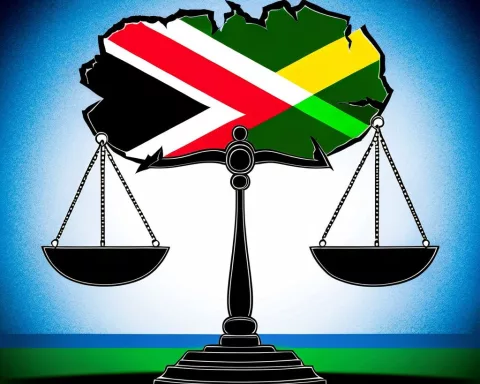South Africa witnessed a historic event with the inaugural session of the National Council of Provinces (NCOP) on June 15th, 2024. The NCOP comprises 54 representatives from all nine provinces, pledging to serve the South African population. Ms. Refilwe Mtshweni-Tsipane from the Mpumalanga province was unanimously elected as Chairperson, while Mr. Kenneth Mmoiemang was elected as Chief Whip. The NCOP embodies the principles of inclusive and democratic governance, prioritizing provincial representation over personal political aspirations.
A New Era Dawns in South African Politics: Commencement of National Council of Provinces. On June 15th, 2024, the inaugural gathering of the National Council of Provinces (NCOP) took place in South Africa. This marks a significant milestone in the country’s governance, with 54 permanent representatives pledging to serve the South African populace. Ms. Refilwe Mtshweni-Tsipane from the Mpumalanga province was unanimously elected as the Chairperson. The NCOP embodies the principles of cooperative governance and intergovernmental relations, fostering an inclusive, democratic governance process.
Inaugural Session of the National Council of Provinces
On June 15th, 2024, the eyes of a nation focused on the inaugural gathering of the National Council of Provinces (NCOP) in South Africa. This memorable event welcomed 54 permanent representatives from all nine provinces of the country, each pledging to serve the South African populace.
This noteworthy occasion was underscored by the election of Ms. Refilwe Mtshweni-Tsipane, a representative hailing from the Mpumalanga province, to the Chairperson’s position. Mr. Kenneth Mmoiemang, a representative from the Northern Cape, put forward her name for the position, which Mr. Patrick Sibande of Mpumalanga seconded. The unanimous election of Ms. Mtshweni-Tsipane speaks volumes about her wide acceptance and the reverence she holds across political spectrums.
Chief Justice Raymond Zondo oversaw the election. Following the NCOP’s protocol, each delegation cast a collective vote instead of individual member ballots. This distinctive system embodies the NCOP’s essence, prioritizing provincial representation over personal political aspirations.
Ms. Mtshweni-Tsipane’s Political Career and Mr. Kenneth Mmoiemang’s Election as Chief Whip
Ms. Mtshweni-Tsipane’s political path has been both inspiring and laudable. Her service as the Premier of Mpumalanga from 2018 to the conclusion of the sixth term is noteworthy. She has been a constant presence in the Provincial Legislature since 2014, chairing several committees such as the Co-Operative Governance and Human Settlements Committee, and the Select Committee on Women, Children, and People with Disabilities. Her tenure as the MEC for Cooperative Governance and Traditional Affairs from 2014 to 2018 solidified her reputation as a devoted and adept administrator.
In the same session, Mr. Kenneth Mmoiemang, a parliament member since 2019, was unanimously elected as the Chief Whip of the NCOP. Mr. Mmoiemang has held important positions like the Chairperson of the Select Committee on Transport, Public Service and Administration, Public Works, and Infrastructure. He also chaired the Ad Hoc Committee on the General Intelligence Laws Amendment Bill. He functioned as the Speaker of the Northern Cape Legislature from 2014 to 2019.
Election of Other Office Bearers and the Role of NCOP
The election for the Deputy Chairpersons and House Chairpersons of the NCOP will be held at a later stage. According to the constitution, the NCOP must elect a Chairperson and two Deputy Chairpersons from the delegates. The Chairperson and one Deputy Chairperson, selected from the permanent delegates, will serve for a five-year term unless their delegate term concludes earlier. The other Deputy Chairperson serves a one-year term, with a delegate from a different province succeeding them. This process ensures each province gets its chance to be represented.
The NCOP, being one of the two Houses of Parliament, holds a significant role in South Africa’s governance. It embodies the principles of cooperative governance and intergovernmental relations, striving for smooth coordination among the three spheres of government. The NCOP’s mission is to represent provincial interests at the national level, fostering an inclusive, democratic governance process.
Post-Inaugural Outlook
With the successful completion of its first session, the stage is prepared for the seventh term of the democratic Parliament. The democratic ethos of South Africa, grounded in representative participation, enables anyone over 18 to indirectly participate in Parliament via elections.
The NCOP, with its unique amalgamation of individual and collective representation, symbolizes South Africa’s democratic spirit. As it embarks on a fresh chapter, there is hope that it will remain a beacon of democracy, reflecting the varied voices of the nine provinces in its legislative process.
What is the National Council of Provinces (NCOP)?
The National Council of Provinces (NCOP) is one of the two Houses of Parliament in South Africa. It is made up of 54 permanent representatives from all nine provinces of the country, with each province having six delegates. The NCOP aims to represent provincial interests at the national level and prioritize provincial representation over personal political aspirations.
Who was elected as the Chairperson and Chief Whip of the NCOP?
Ms. Refilwe Mtshweni-Tsipane from the Mpumalanga province was unanimously elected as the Chairperson of the National Council of Provinces (NCOP) on June 15th, 2024. Mr. Kenneth Mmoiemang, a representative from the Northern Cape, was elected as the Chief Whip.
What is Ms. Mtshweni-Tsipane’s political career?
Ms. Mtshweni-Tsipane served as the Premier of Mpumalanga from 2018 to the conclusion of the sixth term. She has been a constant presence in the Provincial Legislature since 2014, chairing several committees such as the Co-Operative Governance and Human Settlements Committee, and the Select Committee on Women, Children, and People with Disabilities. Her tenure as the MEC for Cooperative Governance and Traditional Affairs from 2014 to 2018 solidified her reputation as a devoted and adept administrator.
What is the role of the NCOP?
The National Council of Provinces (NCOP) embodies the principles of cooperative governance and intergovernmental relations, striving for smooth coordination among the three spheres of government. The NCOP’s mission is to represent provincial interests at the national level, fostering an inclusive, democratic governance process.
What is the process for electing office bearers in the NCOP?
The NCOP must elect a Chairperson and two Deputy Chairpersons from the delegates. The Chairperson and one Deputy Chairperson, selected from the permanent delegates, will serve for a five-year term unless their delegate term concludes earlier. The other Deputy Chairperson serves a one-year term, with a delegate from a different province succeeding them.
What is the post-inaugural outlook for the NCOP?
With the successful completion of its first session, the National Council of Provinces (NCOP) prepares for the seventh term of the democratic Parliament in South Africa. The NCOP strives to remain a beacon of democracy, reflecting the varied voices of the nine provinces in its legislative process.












